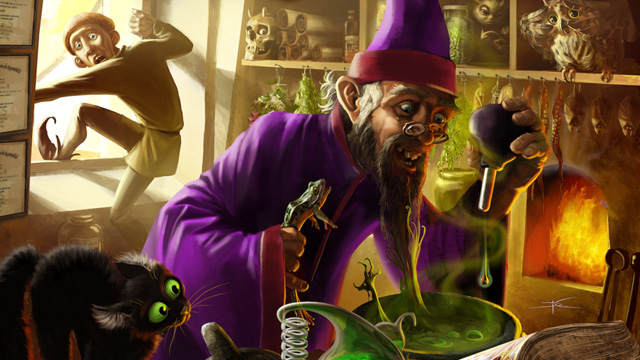
When I talked about Aquasphere, I mentioned my day job in scientific research. Little did I suspect at the time that I would soon play another game, Alchemists, that would essentially focus on the ins and outs of academia (sort of).
In Alchemists, each player takes on the role of a potion brewer attempting to learn the secrets of their art via experimentation and deduction. There are eight “alchemicals” in the world, and eight mystical ingredients that each contain one of them. Your job is to determine which ingredient represents which alchemical.
Each alchemical consists of three atoms: one red, one blue and one green. Atoms can be either positive or negative, as well as either large or small. Mixing any two alchemicals will produce one unique outcome. This will usually be a positive or negative potion of one color, but if you happen to mix two completely opposite alchemicals a neutral concoction is the result.
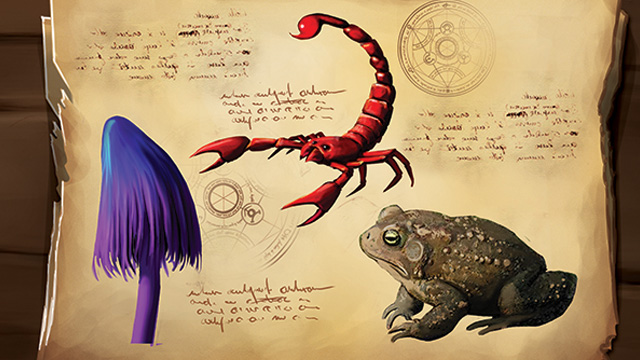
The catch is in the rules for how alchemicals combine. Positive results can only come from positive atoms, and the same for negative. Additionally, you must mix one big atom and one small atom to get the desired result. Knowing these rules, each time you mix ingredients, you learn which alchemicals those ingredients cannot represent. If you mix a raven’s feather and mandrake root to produce a health potion (positive red), for example, you know that neither ingredient can represent an alchemical with a negative red atom.
So how do you know what you’ve produced? There needs to be some sort of neutral party who knows the identity of each ingredient and can interpret their mixtures. While this role could be filled by a spare player using a guide, the best way is for someone to have the free Alchemists app on their smartphone or tablet. This app uses your device’s camera to detect the two ingredients being mixed and then displays the result for all to see while keeping everything else secret and honest. (Alternately the ingredients can by manually selected but this is more vulnerable to chicanery and accidents.)
The actual gameplay in Alchemists is worker placement, spread out over six rounds. Each player first chooses a wake-up time, similar to the mechanic in Fresco. Each time has a reward in ingredients and/or favors except the earliest times, where the bonus is in ensuring you go first. Whoever wakes up latest places their workers first, giving the early risers the extra advantage of knowing what spaces will be fought over.
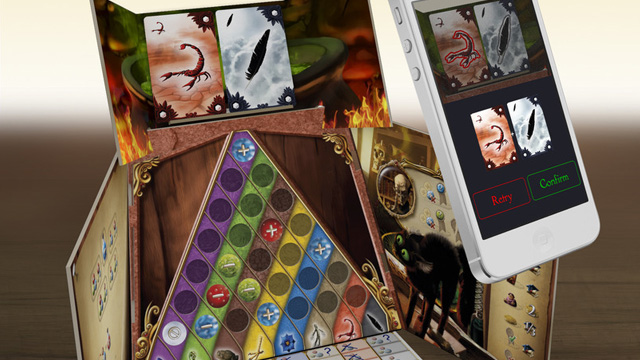
In the first round, several of the action spaces are unavailable. All players can do at this time is gather ingredients, transmute an ingredient into gold, purchase an artifact, or test a potion. Testing itself has two options. You can test on a student at no risk to yourself, but if someone gives a student a negative potion, all subsequent students that turn will have to be bribed with a gold piece first. Alternately, you can test on yourself. Drinking a negative potion here will have dire effects depending on the specific color (loss of a worker next turn, being forced to go last next turn, or losing a respect point) but sometimes you can’t afford guinea pigs research volunteers and have no choice.
In all subsequent rounds, you have the option of selling potions to traveling heroes if you can meet their requests. Should multiple players select this action a small bidding war determines which one will actually go first by offering the hero the biggest discount. Everyone knows which potions you have the knowledge to produce, so positioning here can be very important.
Publishing theories also becomes available starting in round two. To publish, all you need is a gold to cover publishing fees and for your ingredient of choice and corresponding alchemical to be available (unused in a previous publication). If these requirements are met, place one of your endorsements on the ingredient. Alternately, you can support another player’s theory by paying one gold for your publishing fees plus one additional gold to each player who has already published on that ingredient/alchemical. Endorsements can be worth either three or five points at the end of the game (if you are correct), but you can also hedge your bets on one of the alchemical’s colors if you aren’t sure. This kind of endorsement isn’t worth any points at the end of the game but can prevent you from losing them if you are wrong.
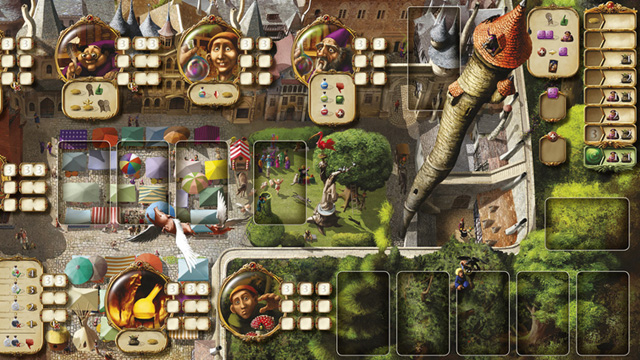
As is the case in real-world academia, publishing is kind of the main thrust of the game. It is a recurring source of points, can provide additional funds (and points) via grants, and publishing early enough can also gain you funds from other players supporting your theories. To further emphasize the importance of publication, there are “conferences” after the third and fifth rounds that will penalize you if you haven’t published enough theories at those points. That is, assuming your theories have not been debunked by this game’s version of the modern-day peer review system…
While debunking is technically available in round two, nothing will be published until after that action happens so it is really only an action from round three on. When accusing another player of being incorrect, you must identify both the ingredient as well as one specific alchemical color where their theory is wrong. The result of this investigation, accurate or not, will be public knowledge. If you are correct, you can immediately publish your own theory on either the ingredient or incorrect alchemical in question — assuming you have a worker on the publishing action. Even if you do not, you still gain points and they lose them, although an incorrect accusation will cost you instead.
There are over 40,000 potential ways the eight alchemicals could be assigned to ingredients, ensuring that each game’s deduction must be fresh. The app chooses one randomly each time you start a new game, and it is easy enough to shuffle tiles into the solution grid if using the low-tech option. The method by which you keep track of your results is not very forgiving when it comes to mistakes, so be careful when recording your data.
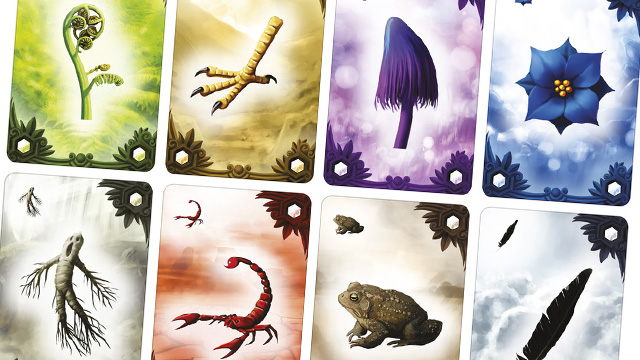
If you like logical deduction, Alchemists is a brilliant game. Estimated playing time is 30 minutes per player, which is going to be even more for the first game or two. I will say that the number of actions you can take each round is more restrictive at higher player counts, and earning gold can be more difficult than it probably should be, but on the whole I have enjoyed Alchemists every time I have played it. If only doing so didn’t drain my phone’s battery like crazy…
Alchemists retails for $60. (The app download is free.)



















